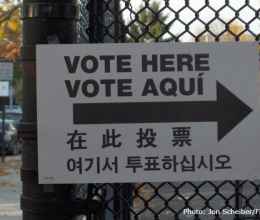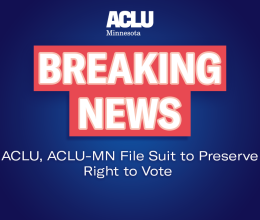
ACLU of Minnesota fights for First Amendment rights at the U.S. Supreme Court.
Voting is a cornerstone of our democracy and the fundamental right upon which all of our civil liberties rest. One should be able to exercise this right at the poll without fear of coercion or intimidation. Free speech is arguably one of the other most fundamental rights and the right to speak freely about out political beliefs is essential to a healthy democracy.
The ACLU fights daily for both of these important rights. A case currently before the U.S. Supreme Court demonstrates the importance of carefully crafted anti-electioneering laws that outline rules for when these two rights intersect. In 2010 a Minnesotan was turned away from the polls for wearing a “Please ID Me” button. Despite the fact that a voter ID amendment was not on the ballot, he was not allowed to vote while wearing this button. While the ACLU routinely opposes voter suppression laws like voter ID, that doesn’t mean someone should be turned away from the polls for wearing a button with that political message.
Well-crafted anti-electioneering laws should only prohibit voters from engaging in speech or expression in support of a candidate or issue on the current ballot. Minnesota’s statute is vague and broad because it prohibits voters from engaging in any form of “political expression” and bans messages that are issue orientated.
Because Minnesota’s statue is both overly broad and vague this could lead to overzealous and unequal enforcement of the law. It gives incredible discretion to election judges to decide what is political and what is not. Many people consider the Black Lives Matter movement or the LGBTQ rights movement to be political. Does this mean that individuals could be banned from wearing a Black Lives Matter t-shirt or a t-shirt with the transgender pride flag?
The 2018 election will be very important in Minnesota, with both U.S. Senators, all U.S. representatives, all statewide offices and the entire Minnesota House up for election. Many groups of people, like immigrants, LGBTQ individuals, women and people of color, are under attack from current elected officials. Expressing their identities at the polling booth shouldn’t be banned. Wearing a rainbow shirt, a #MeToo button, or an “I am a Felon” shirt shouldn’t risk expulsion from a Minnesota voting booth.
Our law should be narrowly tailored, like it is in many other states, to ensure that only speech related to advocacy of a particular candidate or issue on the ballot on that Election Day is banned. Expressing who you are is not electioneering and this fall when people walk into their polling location we want to make sure that everyone has that right protected.
